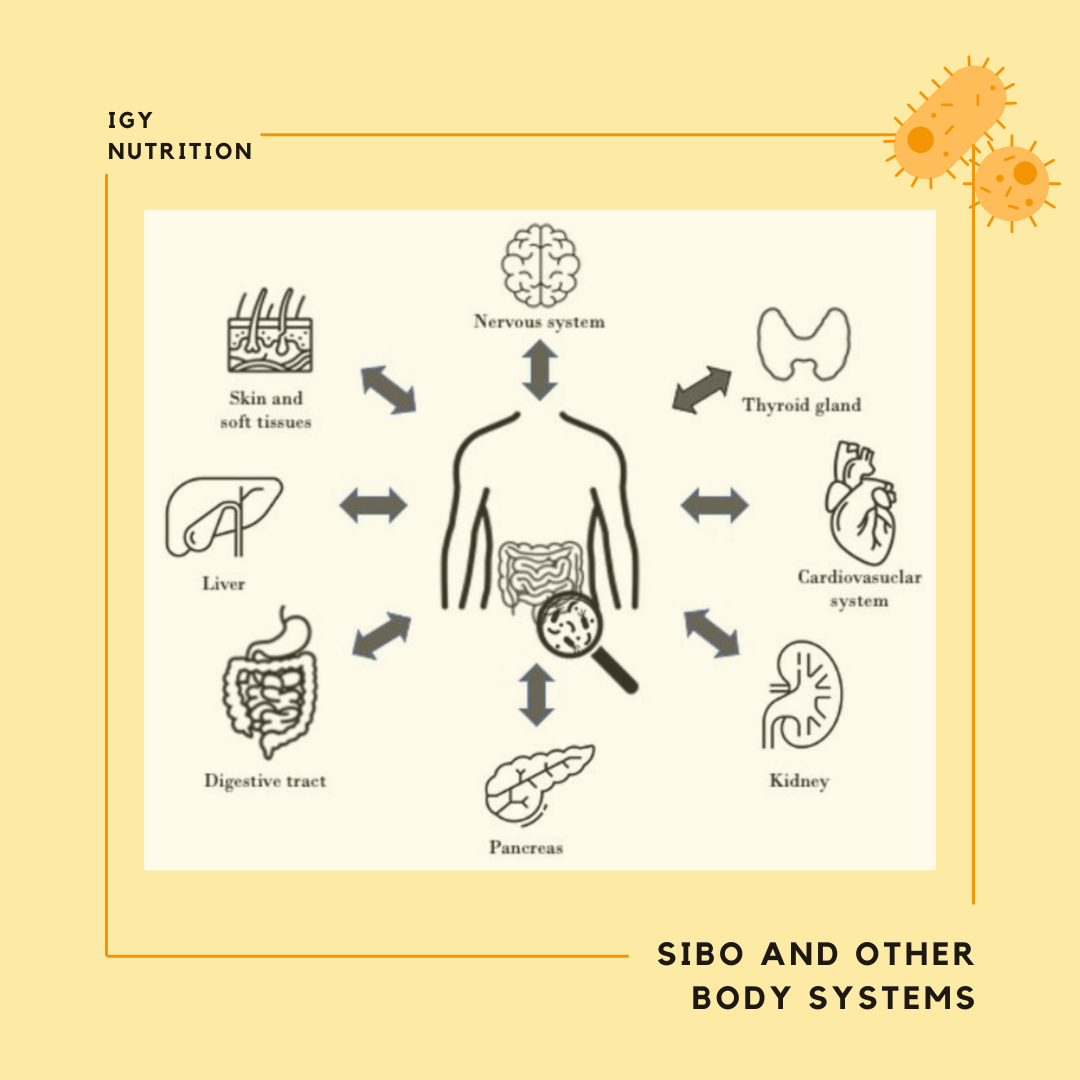Are you constantly bloated, no matter what you eat? Do you experience constipation, diarrhea, or a mix of both? If so, it might be a good idea to get checked for SIBO, small intestinal bacterial overgrowth. Essentially, SIBO is a form of gut microbiome imbalance. If you want to learn more about SIBO, check out our other blogs about SIBO or the recap section below.
Today, we’ll be looking at SIBO’s effects on other systems of the body. A new meta-analysis study in the journal Nutrients examined SIBO’s effects on the kidneys, skin, heart, nervous system, and other body systems. Let’s jump in.
What is SIBO?
In recent years, we’ve all come to know and love the gut microbiome. What we don’t often think about is that the gut microbiome needs to stay where it’s supposed to stay: in the large intestine. When microbes, whether beneficial or harmful, reside in the small intestine, your body has a problem on its hands: SIBO.
The small intestine is meant for nutrient breakdown and absorption. Microbes can get in the way of this process. That’s why most of them are intended to reside in the large intestine. SIBO occurs when an excessive number of bacteria, whether beneficial or harmful, take up residence in the small intestine (Source).
SIBO can cause brutally unpleasant symptoms, such as putrid gas, burping or reflux, bloating or extreme distention, constipation, diarrhea, trouble focusing (referred to as “brain fog”), poor memory, and dysregulated or fluctuating weight (Source). It’s nothing you want to mess with.
If these symptoms seem akin to something you’re going through, keep reading for more help!
Types of SIBO
Identifying the specific type of SIBO is crucial for effective treatment, as each variation responds differently to therapies. The classification of SIBO is based on the invading bacterial strain, the symptoms experienced by the patient, and the type of gas produced. The three primary types are methane-dominant SIBO, hydrogen-dominant SIBO, and hydrogen-sulfide-dominant SIBO (Source).
It’s possible to have more than one type simultaneously. Notably, these types affect gut motility differently, with methane-dominant SIBO causing constipation, hydrogen-dominant SIBO leading to diarrhea, and hydrogen-sulfide-dominant SIBO resulting in a combination of both.
Testing for SIBO
To accurately diagnose SIBO and determine the specific type, testing is essential. The most accessible and cost-effective method is a dual breath test, which can be prescribed by a gastroenterologist or ordered online. This test measures the levels of methane and hydrogen gases produced by the body after consuming a specific liquid.
Breath tests for SIBO are not always perfectly accurate. Lactulose-based tests may produce false positives, while glucose-based tests are more precise but may yield false negatives. We always recommend seeing a healthcare professional experienced in SIBO treatment to interpret test results accurately.
SIBO and the Rest of the Body
In a study called “Show Me What You Have Inside—The Complex Interplay between SIBO and Multiple Medical Conditions—A Systematic Review,” researchers examined how SIBO impacts multiple systems of the body (Source).
According to this study (Source), SIBO can cause issues with our:
- Skin
- Kidneys
- Nervous system
- Immune system
- Endocrine (hormone) system
- Cardiovascular system
- And, of course, the digestive system
The study argues that the gut significantly impacts whole-body health. Let’s take a look at how SIBO seems to affect each system.
Endocrine System: The researchers assert that abnormal gut microbiome composition can contribute to developing thyroid disorders, insulin insensitivity, and both Type 1 and Type 2 diabetes.
Nervous System: SIBO seems to be correlated with Parkinson’s disease, autism spectrum disorders, and brain fog.
Skin: SIBO is correlated with acne, rosacea, and autoimmune conditions like scleroderma.
Nephrology (kidneys): Increased hypertension (high blood pressure), chronic kidney disease, and IgA nephropathy may all be exacerbated by small intestinal bacterial overgrowth.
Gut Health for Whole-Body Health
The list could go on. We encourage you to check out the study to learn more – but the take-home message here is that gut health is critical to keeping the rest of your body healthy. So, what should you do if you have SIBO and can’t seem to shake it?
IgY Antibodies for Gut Health
Antibodies are components of animals’ immune systems that bind to and help to neutralize invaders.
For example, after getting a COVID-19 vaccine, humans develop antibodies specialized to neutralize COVID-19. That way, the next time they are exposed to the virus, their immune system can defend the body from it more easily.
IgY antibodies are a specific type of antibody that can be used to help neutralize specific pathogens living in the human gut. But what exactly are they? Hang in there with us through a short bit of science to find out how IgY antibodies are made:
IgY technology harnesses natural passive immunity processes to develop antibodies for human use. Passive immunity is the transfer of antibodies from one organism to another. This transfer occurs naturally in mammals through breastfeeding. Avian organisms such as chickens transmit antibodies to their young through the yolks of their eggs.
This transfer fortifies the offspring’s immune systems with already responsive antibodies, which the mother has developed in response to her prior exposure to pathogens.
For example, if a mother chicken gets sick with the avian flu, she will develop antibodies to it and pass them on to her offspring through the yolks of her eggs.
Scientists can incorporate naturally-made antibodies of their choosing into medications or supplements by vaccinating mother hens with pathogens of choice. These antibodies can be used to neutralize pathogens in humans. Chicken antibodies, called IgY, work just as well in humans as in chickens.
After allowing the hens time to produce and transmit antibodies in their yolks, scientists extract them from the eggs. After this extraction procedure, the antibodies are ready for use as a medication or supplement. The only ingredient is, well, egg yolk (without the shell)!
Doctors have been enhancing immune responses through artificial passive immunity for decades. IgY antibodies are used in antivenom medications, diagnostic procedures, pediatric norovirus medication, and more. These antibodies have been studied for their use in other applications, such as HIV-induced cachexia, cystic fibrosis, and fibromyalgia.
IgY Antibodies for Dysbiosis
Scientists at IgY Nutrition realized that IgY antibodies could be used to address dysbiosis by neutralizing well-known bad actors in gut microbiomes. So, they created IgY Max.
IgY Max is a specifically immunized egg-based supplement containing antigen-specific antibodies that target and neutralize 29 dysbiotic pathogens commonly found in the human gut microbiome, including Klebsiella pneumoniae, Salmonella, various strains of Staphylococcus and Streptococcus, and more.
In non-science speak: IgY Max is a supplement (made of only egg yolk) containing antibodies that neutralize pathogens living in the gut. These pathogens could contribute to your digestive symptoms if you have them.
Upon consumption, IgY Max antibodies exert their anti-pathogenic activity throughout the entire length of the gastrointestinal tract. They have a high pathogen-antibody affinity, inhibiting bacterial adhesion, suppressing colonization, and neutralizing each targeted pathogen thoroughly. Neutralized pathogens are expelled from the gut through the stool (your poop!).
The product’s neutralization of pathogens allows beneficial microbes to flourish, which may help to restore microbial diversity to the microbiome and rebalance it. This positive shift in microbiome composition reduces dysbiotic pathogens’ initiation of gastrointestinal damage and amplifies healthy flora’s conferral of gastrointestinal benefits.
University-led studies of IgY Max confirm this, showing that IgY Max consumers’ beneficial flora, gut barrier integrity, and inflammation levels improved significantly over eight weeks of use.
Participants’ levels of inflammatory cytokines, high-sensitivity C-reactive protein, helpful bacteria counts in the stool, zonulin, histamine, and diamine oxidase improved substantially. Perhaps most importantly, participants’ symptoms improved upon use.
Consumers report decreased symptoms of dysbiosis following consistent consumption, including improved stool regularity and composition, reduced bloating and gas, and higher energy levels. Though unofficial, the abundance of positive Amazon reviews describing users’ alleviation of symptoms is a telling indicator of IgY Max®’s power to benefit consumers.
Equipped with antibodies that clear out dysbiotic pathogens, you’ll be on a path to digestive health in no time. Tag us on Instagram at @igynutrition to let us know how your digestive health journey is going!




